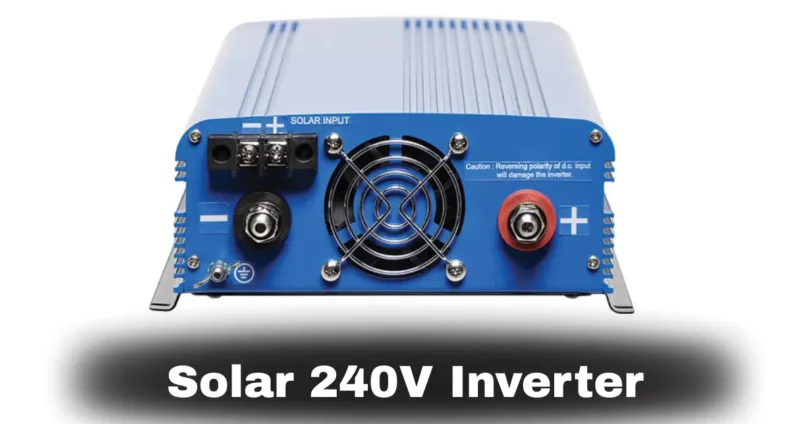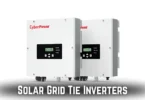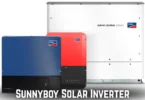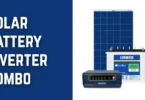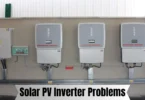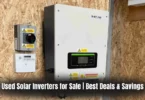A solar 240V inverter is an essential component in any solar power system. It converts the direct current (DC) electricity generated by solar panels into alternating current (AC) electricity, which is what most home appliances and devices use. Without a solar 240V inverter, your solar system wouldn’t be able to provide power to your home.
In this article, we’ll explore how solar 240V inverters work, the benefits they offer, and how to choose the right one for your needs. Whether you’re new to solar energy or looking to upgrade your system, understanding the role of a 240V inverter is key to making the most of your solar setup.
How Does a Solar 240V Inverter Work?
A solar 240V inverter plays a crucial role in converting solar energy into usable power for your home. Here’s a step-by-step breakdown of the process:
Conversion from DC to AC
- Solar panels generate direct current (DC) electricity when exposed to sunlight.
- The inverter converts this DC into alternating current (AC), which is needed for household appliances.
- Without this conversion, the power generated by the solar system would be unusable for most home electronics.
Power Flow Regulation
- The inverter ensures that the right amount of AC power is sent to your home.
- It manages the flow of electricity, adjusting for any changes in solar power generation throughout the day.
- This helps keep your system stable and prevents overloads.
Synchronization with the Grid
- If your system is connected to the grid, the inverter helps synchronize the solar power with the grid’s electricity.
- This makes sure the power generated by your solar system matches the grid’s voltage and frequency.
Maximizing Efficiency
- The inverter optimizes the energy produced by the solar panels.
- It reduces energy loss during the conversion from DC to AC, ensuring that as much energy as possible is used in your home.
Benefits of Using a Solar 240V Inverter
A solar 240V inverter offers several advantages, making it a smart choice for anyone looking to harness solar energy. Below are some key benefits:
Efficiency in Energy Conversion
- High Conversion Rates: A 240V inverter ensures a high rate of energy conversion from DC to AC, minimizing energy loss.
- Optimal Performance: It helps your solar system perform at its best, even during cloudy days or at varying sunlight levels.
- Reliable Power Supply: It provides a consistent and reliable power output for your home, making sure you get the most out of your solar setup.
Cost Savings Over Time
- Lower Electricity Bills: By converting solar energy into AC power, a 240V inverter helps reduce reliance on grid electricity, lowering monthly power bills.
- Return on Investment (ROI): Over time, the savings on energy costs outweigh the initial cost of the inverter, making it a financially smart investment.
- Increased Home Value: Solar systems with high-quality inverters can increase the overall value of your property.
Environmental Benefits
- Reduction in Carbon Footprint: Solar energy is clean and renewable. Using a 240V inverter helps reduce greenhouse gas emissions by relying less on fossil fuels.
- Sustainable Energy Source: Solar power is a sustainable, eco-friendly alternative to traditional energy sources, contributing to a greener planet.
- Energy Independence: By generating your own electricity, you reduce the need for energy from non-renewable sources, promoting a more sustainable future.
Key Features of a Solar 240V Inverter
When choosing a solar 240V inverter, it’s important to consider certain features that will ensure you get the most reliable and efficient performance. Here are the key features to look for:
Power Capacity and Load Handling
- Adequate Power Output: A 240V inverter should be able to handle the power generated by your solar panels without overloading.
- Supports High Loads: It should be able to power multiple appliances and devices in your home, even during peak energy usage.
- Scalable Options: Some inverters allow you to expand your system, making it easier to add more solar panels in the future.
Compatibility with Various Solar Panels
- Wide Compatibility: A good 240V inverter works with most solar panels, making it easy to integrate into your existing system.
- Maximized Efficiency: It ensures that the energy from your solar panels is converted to AC power without any loss in efficiency.
- Versatile Setup: You can mix and match solar panels and inverters based on your specific needs and energy demands.
Durability and Lifespan
- Long Lifespan: High-quality 240V inverters typically last for 10 to 15 years, offering reliable service throughout their lifetime.
- Built to Withstand the Elements: These inverters are designed to handle outdoor conditions, with protection from dust, moisture, and heat.
- Low Maintenance: Many solar inverters require minimal maintenance and are designed for long-term, hassle-free performance.
Choosing the Right Solar 240V Inverter for Your Needs
Selecting the right solar 240V inverter is crucial for maximizing the performance and efficiency of your solar power system. Here’s what you need to consider:
Factors to Consider: Size, Efficiency, and Installation
- Inverter Size: Choose an inverter that matches the output capacity of your solar panels. A larger system requires a higher-capacity inverter.
- Energy Efficiency: Look for inverters with high efficiency ratings to ensure minimal energy loss during the conversion from DC to AC power.
- Ease of Installation: Consider how easy it will be to install the inverter. Some inverters are more complex to install and may require professional help.
- Compatibility with Other Equipment: Make sure the inverter is compatible with your solar panels, batteries, and any other equipment in your setup.
Common Mistakes to Avoid When Selecting an Inverter
- Choosing an Undersized Inverter: If your inverter isn’t powerful enough, it may struggle to handle the energy produced by your solar system, causing inefficiency.
- Ignoring Efficiency Ratings: Not all inverters are created equal. Choosing one with low efficiency can lead to wasted energy and higher electricity costs.
- Overlooking Warranty and Support: Always check the warranty terms and the support offered by the manufacturer to avoid costly repairs or replacements down the line.
- Focusing Only on Price: While it’s tempting to choose the cheapest option, it’s important to consider quality, durability, and performance to ensure long-term reliability.
Installation of a Solar 240V Inverter
Proper installation of a solar 240V inverter is essential for ensuring your solar system functions efficiently and safely. Here are the key steps involved in the installation process:
Steps Involved in Installing a 240V Inverter
- Positioning the Inverter: Choose a dry, cool, and well-ventilated area to place the inverter. It should be away from direct sunlight and moisture.
- Connecting the Solar Panels: Link the output of your solar panels to the input of the inverter using appropriate wiring. This step is critical for energy transfer.
- Wiring to the Electrical Panel: Connect the inverter to your home’s electrical panel, ensuring proper wiring for safe and effective power distribution.
- Grounding the System: Properly ground the inverter to protect it from electrical surges and ensure safety during operation.
- Final Testing and Commissioning: Once the inverter is connected, test the system to make sure it’s converting DC to AC power correctly and powering your appliances efficiently.
Importance of Professional Installation
- Safety First: Installing a solar inverter involves working with electrical systems, which can be dangerous if not handled properly. Professional installers are trained to do this safely.
- Correct Wiring and Configuration: Professionals ensure that all wires are properly connected, and the inverter is configured for optimal performance and safety.
- Avoiding System Damage: Improper installation can damage your solar panels, inverter, or other equipment, leading to costly repairs.
- Warranty Protection: Many inverter manufacturers require professional installation to honor the warranty. Installing the system yourself may void this warranty.
Maintenance and Care for Solar 240V Inverters
To keep your solar 240V inverter running efficiently and ensure long-term performance, regular maintenance and care are essential. Here’s how to maintain your system:
Routine Checks and Cleaning
- Inspect for Dust and Debris: Periodically check the inverter for dirt, dust, or leaves, especially around vents. Clean it gently using a soft cloth.
- Check for Overheating: Ensure that the inverter’s vents are not blocked and that it’s not overheating. High temperatures can reduce its lifespan.
- Monitor Performance: Regularly check the inverter’s display or app (if available) to monitor energy production and ensure it’s operating at full capacity.
- Check Wiring and Connections: Look for any loose or frayed wires. Tighten or replace any connections that appear damaged or worn out.
Troubleshooting Common Issues
- Inverter Not Turning On: If the inverter doesn’t turn on, check the circuit breaker, ensure it’s connected to the solar panels, and verify the power supply.
- Low or No Power Output: If your inverter is producing less power than expected, check for any shading on the solar panels or dirty panels that could be reducing energy production.
- Error Messages or Fault Codes: Inverters often display error codes when something’s wrong. Refer to the user manual for troubleshooting tips related to specific codes.
- Inverter Overheating: If the inverter is overheating, check for blocked vents or place it in a cooler, more ventilated area.
Solar 240V Inverter vs. Other Types of Inverters
When choosing an inverter for your solar power system, it’s important to understand the differences between a solar 240V inverter and other types like 110V, hybrid, and off-grid inverters. Here’s how they compare:
240V Inverter vs. 110V Inverter
- Power Output: A 240V inverter delivers higher voltage, making it suitable for larger homes or systems with higher energy demands.
- More Efficient for Larger Loads: 240V systems are better suited for running multiple appliances or high-power devices like air conditioners, making them ideal for residential use.
- Wider Grid Compatibility: A 240V inverter is commonly used in countries with a 240V power standard, while a 110V inverter is more common in regions like North America.
- Better for Solar Systems: 240V inverters work more efficiently with large solar panel arrays and ensure a stable power supply for larger homes.
240V Inverter vs. Hybrid Inverter
- Dual Functionality (Hybrid): A hybrid inverter combines both grid-connected and battery storage functions, allowing you to store excess energy for later use.
- More Complex Setup (Hybrid): Hybrid inverters tend to be more expensive and require a more complex setup compared to 240V inverters, which are simpler to install and operate.
- Energy Storage Options (Hybrid): Hybrid inverters are ideal if you want to incorporate a battery system to store solar power for nighttime or power outages.
- Cost and Maintenance: While hybrid inverters offer more flexibility, they may require more maintenance and come with a higher upfront cost than a standard 240V inverter.
240V Inverter vs. Off-Grid Inverter
- Grid Connection (240V): A 240V inverter is typically used in grid-connected systems, ensuring a steady supply of power and allowing you to sell excess energy back to the grid.
- Standalone Systems (Off-Grid): Off-grid inverters are used in systems that are not connected to the grid. They rely on battery storage to power homes or remote locations without access to utility power.
- Battery Requirements (Off-Grid): Off-grid systems often require large battery banks for energy storage, while a 240V inverter does not necessarily need batteries if connected to the grid.
- Cost Efficiency (240V): 240V inverters are generally more affordable and easier to install than off-grid inverters, which require additional components like charge controllers and batteries.
Why Choose a 240V Inverter Over Others?
- Larger Power Capacity: A 240V inverter can handle more power, making it suitable for bigger homes or commercial applications.
- Grid Stability: It ensures a stable connection to the grid, providing consistent power to your home while allowing you to sell surplus energy back.
- Lower Upfront Cost: Compared to hybrid or off-grid systems, 240V inverters are simpler and more cost-effective to install, making them ideal for residential users who want reliable grid power without additional complexity.
- Compatibility with Appliances: It works well with most household appliances, including high-power items like electric stoves, washing machines, and HVAC systems.
Conclusion
A solar 240V inverter is a great choice for homes with higher energy needs, especially if you’re looking for a reliable connection to the grid. It offers efficient power conversion, is easy to install, and works well with a wide range of household appliances.
While hybrid and off-grid inverters have their own benefits, a 240V inverter provides a cost-effective and straightforward solution for most residential solar systems. If you want a stable, high-performance system, a 240V inverter is definitely worth considering!
Common FAQs About Solar 240V Inverters
What is a solar 240V inverter?
A solar 240V inverter converts the energy generated by your solar panels (DC power) into usable AC power for your home (240V). It makes the solar energy ready to power appliances and devices.
Why do I need a solar 240V inverter?
You need a solar 240V inverter to convert the electricity produced by your solar panels into the type of electricity (AC) that most home appliances use. Without it, you can’t use the energy your solar panels produce.
How does a 240V inverter work?
The inverter takes the direct current (DC) electricity from the solar panels and converts it into alternating current (AC) electricity, which powers your home’s appliances.
Can I use a 240V inverter with any solar panel?
Yes, as long as the inverter is compatible with the power output of your solar panels. It’s important to match the inverter’s capacity with your solar panel system for the best results.
How long does a solar 240V inverter last?
A solar 240V inverter typically lasts around 10 to 15 years with proper care and maintenance. Regular checks can help extend its lifespan.

